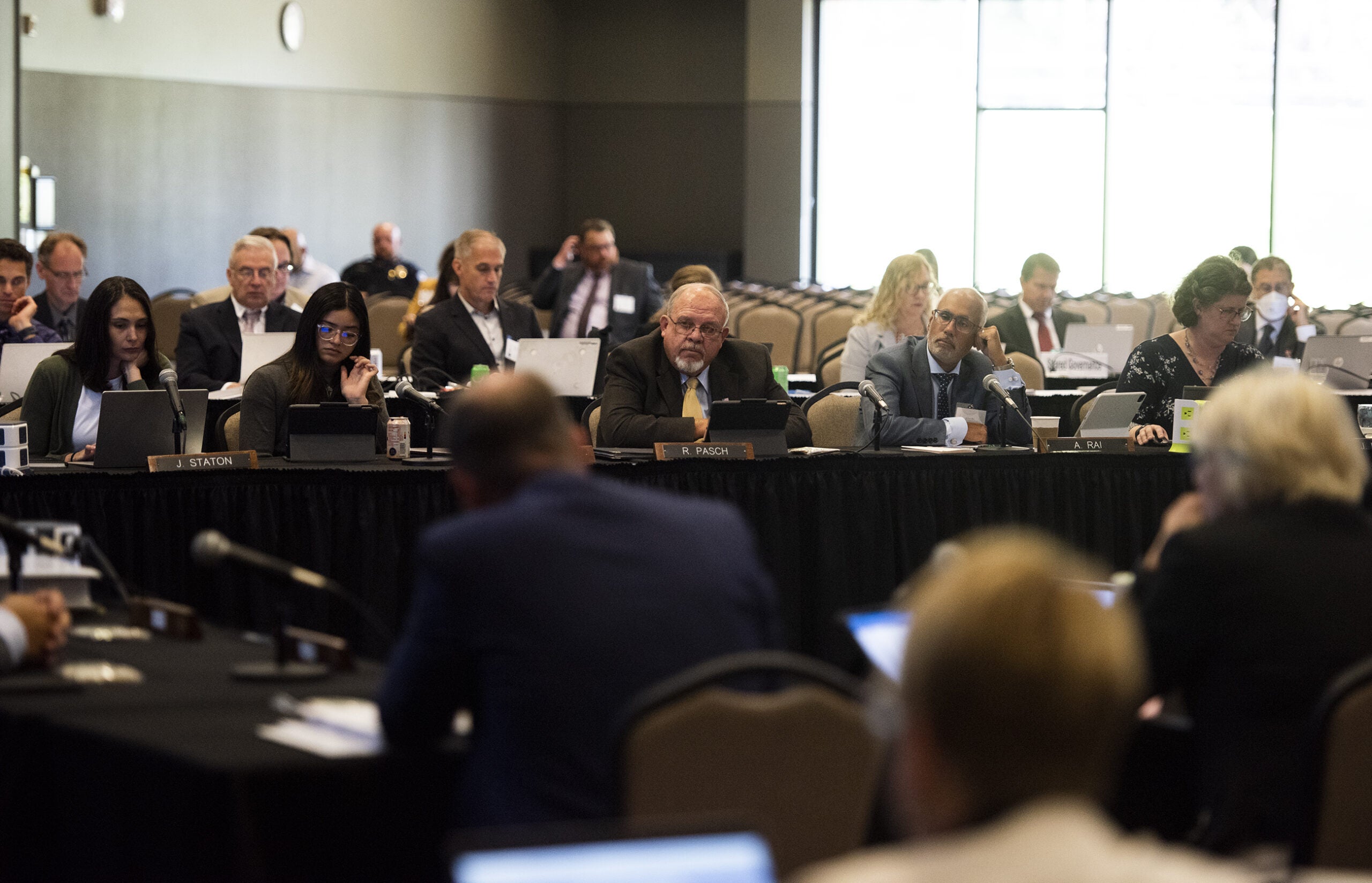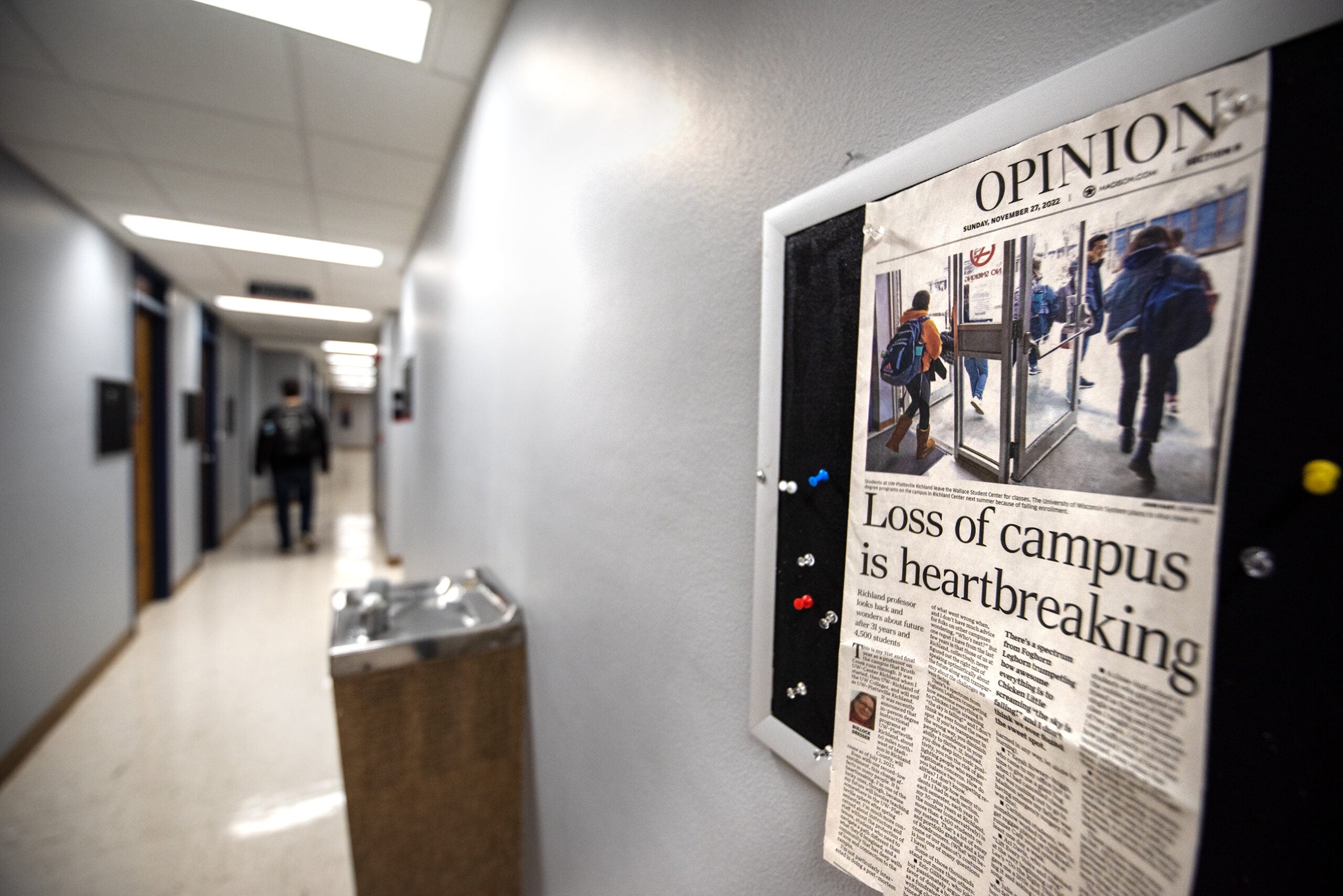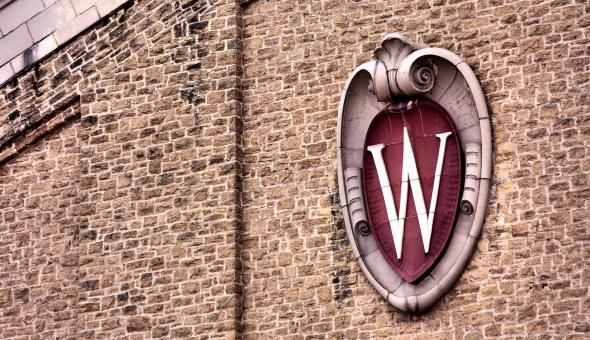In-state undergraduate students in the University of Wisconsin System will see the first tuition hike since Republican state lawmakers instituted a tuition freeze a decade ago.
The UW System Board of Regents on Thursday approved the tuition hike with 16 members voting in favor and one voting against. Regents Héctor Colón and Jennifer Staton were not present. The average increase of 5 percent comes as a GOP bill aims to limit the board’s tuition setting authority once again.
Regents exercised their authority to set tuition rates for the first time since Republican legislators froze tuition in 2013.
News with a little more humanity
WPR’s “Wisconsin Today” newsletter keeps you connected to the state you love without feeling overwhelmed. No paywall. No agenda. No corporate filter.
Before the vote during the board’s meeting Thursday at UW-Stout, UW System President Jay Rothman said the increase is necessary to maintain the long-term financial viability of state universities in the face of steep inflation and a decade of unchanged tuition rates.
“Given many factors, not the least of which are inflationary pressures over that period, a tuition freeze is simply no longer financially sustainable,” Rothman said.
The freeze came after Republican state lawmakers balked at growing UW System reserves following five consecutive years of tuition hikes. Then in 2015, legislators cut $250 million from the UW System’s budget, forcing it to spend down reserves.
“Our continued reliance on balancing our books by drawing on our savings accounts, which we are doing in a number of cases in our universities, is neither financially prudent nor sustainable,” said Rothman.
Thursday’s vote means tuition increases among the state’s 13 universities will vary this fall. In-state undergraduates at UW-Madison will see the lowest increase of 4 percent, which works out to an additional $373 per year. UW-Oshkosh will raise its tuition by 5.9 percent or $384; UW-Platteville students will see tuition go up by 6.4 percent or $409. UW-Green Bay will see the largest tuition increase of 7.4 percent or an additional $469 per year.
Tuition will also go up at the UW System’s two-year schools. UW-Green Bay’s campuses in Manitowoc, Marinette and Sheboygan will see the largest increase of 13.5 percent or $643 annually. Tuition will increase 4.5 percent or $214 per year at the UW’s nine other two-year campuses. Figures for UW-Platteville Richland weren’t included as classes will cease there July 1.
Regent documents prepared by the UW System say the increases at what UW-Green Bay calls alternate locations is part of a plan to create a “One University, Four Campus” model for the campuses that served as independent UW colleges before a 2018 merger.
“Under this model the tuition at the additional locations will increase over four years to equal the tuition rate at Green Bay,” said the regent materials.
Currently, a year of tuition at UW-Green Bay is $6,298, while tuition at the campuses in Manitowoc, Marinette and Sheboygan is $4,750 per year.
According to meeting materials, a large portion of the new revenue generated by tuition increases will pay for employee pay raises and benefits. Regents have requested a 4 percent raise for UW workers starting in Jan. 2024.
UW System Vice President for Finance, Sean Nelson, said the state picks up 70 percent of the cost for those raises with the rest coming from universities via tuition revenue. He said that means campuses have incurred nearly $50 million of additional expenses over the past four years.
“This is significant,” Nelson said. “And again, (it’s) probably the number one reason we’re coming to you today with a modest ask, an increase in tuition.”
The tuition increases at state universities and branch campuses are sure to get the attention of Republican state lawmakers as they craft the next UW System budget. A GOP bill introduced just days before the board’s vote aims to limit regents’ ability to raise tuition in future years.
Before voting to approve the increase, Regent Bob Atwell said he expects the board “to get some blowback” for their vote.
“I really want to emphasize the faculty and staff (pay) equity issues which we’re not balancing on the back of tuition,” Atwell said. “There are other revenue sources that we’re actively seeking.”
Regent Ashok Rai said he has already gotten emails about financial stresses among students and families.
“It may seem odd, but this is for them to make sure that we have the resources to make sure that we provide an education they expect,” said Rai.
Regent Rodney Pasch, who also serves as president of the Wisconsin Technical College System Board, cast the sole vote against the tuition increase. He said while he believes it was unfair that the UW System wasn’t allowed to raise rates in the past, it means students will pay around $200 and $300 more per year for tuition.
“And they only have a few ways to do that,” Pasch said. “Either they have savings that they can pull it out of, or if they have a job, they have to work some additional hours, or they have to go in debt, and we know debt is a certain problem students are dealing with today.”
Pasch said he would have liked to see tuition increase by less than the average of five percent.
In addition to the tuition and fee increases, the UW System is seeking an additional $262 million in general purpose revenue from the Legislature. In his state budget proposal, Gov. Tony Evers recommended an increase of $133.6 million. It’s unclear how the Legislature’s GOP-controlled Joint Finance Committee will approach the UW System’s and Evers’ requests.
Editor’s note: Wisconsin Public Radio is a service of the University of Wisconsin-Madison and the Wisconsin Educational Communications Board.
Wisconsin Public Radio, © Copyright 2025, Board of Regents of the University of Wisconsin System and Wisconsin Educational Communications Board.






